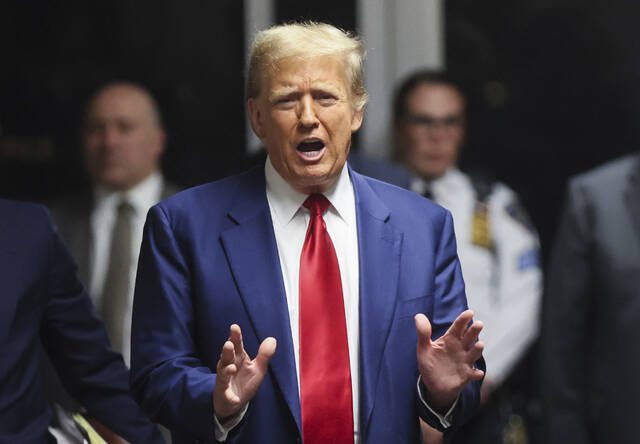A judge in New York has rejected Donald Trump’s attempt to delay his hush money criminal trial until the Supreme Court makes a decision on presidential immunity claims he made in another one of his criminal cases. Several more requests are waiting for a decision.
A judge in Manhattan called the request from Trump's lawyers untimely, saying that they had many chances to bring up the immunity issue before they finally did so last month, well after the deadline for pretrial motions had passed.
According to Merchan, the timing of the defense’s filing on March 7 “raises real questions about the sincerity and actual purpose of the motion,” as mentioned in a six-page decision.
The lawyers representing Trump, who is the presumptive Republican nominee, had requested the New York trial be postponed indefinitely until the immunity claim in his election interference case in Washington, D.C. is resolved.
Trump claims he cannot be prosecuted for alleged official acts during his time in office. His lawyers have not used that as a defense in the hush-money case, but they have argued that evidence, such as Trump’s social media posts about his former lawyer Michael Cohen, should be excluded from the trial due to his immunity protections.
The Supreme Court is set to hear arguments on April 25, which is a week and a half after jury selection begins in the hush-money case.
Trump’s lawyer Todd Blanche chose not to comment. The Manhattan district attorney’s office also declined to comment.
Trump first brought up the immunity issue in his Washington criminal case, which involves allegations that he tried to overturn the results of his 2020 election loss leading up to the riot by his supporters at the U.S. Capitol on Jan. 6, 2021.
In his ruling, Merchan made a distinction between the Washington case, which he referred to as the Federal Insurrection Matter, and the hush-money case he’s overseeing.
In Washington, Trump is attempting to use presidential immunity to have the charges thrown out on the basis that he has “absolute immunity from federal criminal liability,” the judge wrote. In the hush-money case, Trump is trying to prevent evidence of what prosecutors claimed was his “pressure campaign” against Cohen and other witnesses.
The hush money case revolves around allegations that Trump altered his company’s internal records to conceal the true nature of payments to his former lawyer Michael Cohen, who assisted Trump in burying negative stories during his 2016 presidential campaign. Among other things, Cohen paid porn actor Stormy Daniels $130,000 to keep her claims of a sexual encounter with Trump years ago under wraps.
Trump pleaded not guilty to 34 felony charges of falsifying business records last year. He has denied having a sexual encounter with Daniels, and his legal team argues that the payments to Cohen were legitimate legal expenses and not part of any cover-up.
The trial for hush money, the first of Trump’s four criminal cases set to go before a jury, was originally planned to start on March 25. But Merchan delayed it to April 15 after Trump’s lawyers complained about a sudden release of documents from a previous federal investigation that resulted in Cohen going to prison.
Trump and his lawyers have continued to push for more delays, using complaints about Merchan and concerns about getting a fair trial in heavily Democratic Manhattan to ask for more time at the last minute. This is the latest version of the strategy Trump announced to TV cameras outside a pretrial hearing in February: “We want delays.”
Trump’s lawyers are once again asking Merchan to step aside from the case. They argue in a letter to the judge this week that he may have a conflict of interest because of his daughter’s work as a Democratic political consultant. Merchan rejected a similar request to step down last year. If he were to do so now, the trial schedule would be disrupted, as time would be needed to assign a new judge and get that person up to speed.
In other recent filings, Trump’s lawyers argued that the trial should be postponed indefinitely until the negative media coverage of the case decreases. They also argue that by trying to make the case about the 2016 election, prosecutors in the liberal borough are “trying to give jurors a chance to vote” on Trump’s win in that race.
Prosecutors opposed that on Wednesday, arguing that publicity about the unprecedented trial of the former president is “unlikely to recede” anytime soon. They blamed Trump’s “constant rhetoric” for generating significant publicity, adding that “it would be wrong” to give him a delay “based on media attention he is actively seeking.”
Prosecutors said the jury selection process — with additional questions designed to remove biased prospects — will allow both sides to pick an impartial jury.
In his ruling Wednesday, Merchan wrote that Trump’s delay in raising the immunity issue earlier seemed unbelievable, since the former president’s lawyers had previously mentioned presidential immunity in a failed attempt last year to move the hush-money case from state court to federal court.
U.S. District Judge Alvin Hellerstein rejected Trump’s claim that the allegations in the hush money indictment involved official duties, writing last July, “The evidence overwhelmingly suggests that the matter was purely a personal item of the President — a cover-up of an embarrassing event.”
“Hush money paid to an adult film star is not related to a President’s official acts. It does not reflect in any way the color of the President’s official duties,” Hellerstein added.
The question of whether a former president is immune from federal prosecution for official acts taken in office has not been legally tested.
Prosecutors in the Washington case have said no such immunity exists and that, in any event, none of the actions alleged in the indictment count as official acts. The trial judge in Washington and a federal appeals court have both ruled against Trump.



